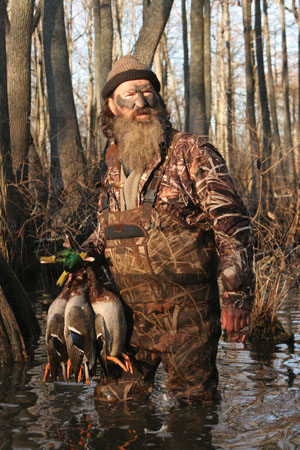 Joe:When did you build your first duck call that was available for sale?
Joe:When did you build your first duck call that was available for sale?
Phil: The mid-1970s.
Joe: When did you produce your first video?
Phil: Mid-1980s.
Joe: Why did you begin filming hunting?
Phil: At that time, all the hunting we had ever seen on TV was Curt Gowdy on Wide World of Sports on Sunday evening. One day, I was sitting there with my boys, and I said I can't figure out why these people around Stuttgart, I can't figure out why they don't have duck-hunting videos. I think we ought to film ourselves shooting ducks; I think people would buy that. At that time, camera equipment had a big old battery and the thing weighed 40 pounds. There were no disks. It was eight-track tape.
I found people in Dallas who rented video cameras. It cost $750 a day, which I thought was highway robbery. I hadn't thought yet about who would film for me. I found some brothers up at the church who were camera buffs, but they had no video experience. I told them they needed to learn quick. I lined them up, and we made the first video down in south Louisiana. I put the cameramen up in some trees. We made that thing and took it to a studio. They edited it and put it together. I think we sold about 50 that year.
Joe: How, then, did the video business build to what it is now?
Phil: At that time, we had one serious problem; we had no distribution. I was selling duck calls out of my truck, driving around. I got a few started in Wal-Mart, just like selling watermelons. I said "Hey, Colonel Sanders started with one chicken somewhere, so give me a break here. Someone liked his chicken; the rest is history…" One day the buyer at Wal-Mart called me up to authorize me to do what I was already doing — selling to Wal-Mart. About the time of "Duckman 3," they picked up our videos, and the rest is history. That was when I was asked for my first autograph from a little boy. I still remember that. From there, everywhere I went, people asked for my autograph. I go into sporting-good stores now and see all the videos on the wall and just think, "Boy, we plowed the ground on that one…"
Joe: Let's talk hunting. What's the single biggest mistake you see most duck hunters make?
Phil: The No. 1 mistake all duck hunters make is they do not conceal themselves well enough. Or they don't spend enough time before duck season so they are literally invisible. The first way to screw up is the blind. Next, once you get in there, the way a deer or a duck recognizes a human is by their face. So you need to streak black, green and brown all over your face, so nothing but your eyeballs are showing.
Joe: So facepaint is a mandatory Duck Commander routine and definitely kills more ducks?
Phil: No doubt about it. In fact, in my opinion, if you just put facepaint on, you'll kill 25 percent more ducks.
Joe: You think that high; you think that much?
Phil: No doubt about it.
Joe: Are there significances to the beards? Other than fashion?
Phil: The beards were pre-duck calls. Hair begins to come out of man’s face in the teenage years. Somebody convinced every able-bodied American male that the reason that hair is there is so every day you can scrape it off.
Let's see, I'm going to spend a winter outside — be out there every day. Me being a Genesis man — the Almighty made us with hair coming out of our face — is there a remote possibility that the reason it’s there is because it’s supposed to be there? Protection — UV rays, wind, cold?
I'm just thinking whiskers are a good thing. I'm doubting the logic that the reason they are there is to scrape them off every day. What they’re saying is, "Make your face like a woman." At one time in our culture, all men wore beards. For my line of work, it makes sense.
Joe: Did you come up with biting the heads to kill ducks, and do you still practice the tradition?
Phil: A lady called me from New York and said she witnessed her son put a duck's head in his mouth and crunch down. She said I taught her son to do it. I said we have to kill the ducks immediately upon possession, by federal law. We discussed other methods. She didn't like any of them. I told her I didn't know a nice way to kill a duck. I told her if that's the worst thing her son ever does, she had raised a fine boy. I've never seen anyone else do it. It's a very quick way to put a duck out of its misery.
Joe: Other than a shotgun, what is the single most important piece of equipment or factor to duck hunting success?
Phil: The only thing second to a shotgun is staying power. These ducks are pretty slick. Human beings try to pattern ducks so they can kill them. These ducks in the 21st century are so slick that they are now patterning us. If you notice in a refuge area, the ducks know exactly what time the hunters leave the refuge area, they know the places where we're not going to hunt at all, and that's where they stay. The federal refuge system is 130 million acres. Sixty percent of that you can't hunt, like 75 million acres. The ducks got it down to a science. We have conditioned them. Seventy-five million acres — that will hold them all.
>> Part 2 of Phil's Interview coming soon.






